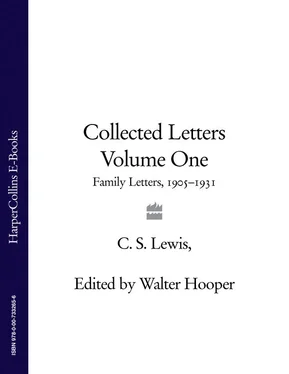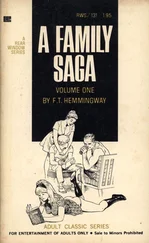[Gastons
20 October 1914]
My dear Arthur,
Many thanks for the letter, which I hope is becoming a regular ‘institution’, and apologies for my comparative slackness in replying. When I read your description of the boring evening I thought for a while of writing you a letter full of ‘war’–to hear your views afterwards. But, to be serious, what would you? Is the trivial round of family conversation ever worth listening to, whether we are at war or no? I can promise you that it is not at Little Lea and if Bernagh is different it must be an exceptional household. The vast majority of people, too, whom one meets outside the household, have nothing to say that we can be interested in. Their circle of interests is sternly practical, and it is only the few who can talk about the really important things–literature, science, music & art. In fact, this deadly practicalness is so impressed on my mind, that, when I have finished Loki, I am resolved to write a play against it.
The following idea has occurred to me: in Irish mythology the ruling deities are the light & beautiful Shee: but, we are told, before these came, the world was ruled by the Formons, hideous and monstrous oppressors. What are the exact details of the struggle between the two parties I do not know. But it ought to make a good allegorical story, in which the Formons could be taken as typical of the stern, ugly, money grubbing spirit, finally conquered by that of art & beauty, as exemplified by the lovely folk of the Shee. However, of course, this is only a castle in the air.
I sympathize with your difficulty in drawing a horse, as I have often made the attempt in the days when I fancied myself in that line. But of course that counts for nothing: as the easiest of your sketches would be impossible for me. But there are heaps of pictures in which you need not introduce the animal. I hope the music has started in real earnest by now. The longer I stay at this place, the better I like it. Mrs. K., like all good players–including yourself-is lazy and needs a lot of inducement before she performs.
yours sincerely
C. S. Lewis
TO HIS FATHER (LP IV: 234):
[Gastons 25?
October 1914]
My dear Papy,
You have surpassed yourself. The popular press, of whose reliability the Russian rumour is an example, remarks on the possibility of an invasion: the idea, after being turned over in your mind, appears in your next letter, clothed as ‘it is absolutely certain that he is going to invade England’ 48 Surely, Joffer, this is rather hyperbole? The one thing that Britain can depend upon is her fleet: and in any case Germany has her hands full enough. You will perhaps say that I am living in a fool’s paradise. ‘Maybe thon’. But, providing it only be a paradise is that not preferable to a wise and calculating inferno? Let us have wisdom by all means, so long as it makes us happy: but as soon as it runs against our peace of mind, let us throw it away and ‘carpe diem’. 49 I often wonder how you came to have such a profound and genuine philosopher for your son, don’t you?
I received and duly posted your letter to the Colonel: though why it should reach him any more easily from Bookham than from Belfast I don’t know. It seems to me outrageous that you can’t get a letter through. I suppose he is still at Aldershot and that they are allowed to receive letters? I think the ‘my bankers’ 50 wheeze is immense. The brother of that Smythe fellow, who was staying here some days ago, has lost his arm and is coming home. It begins to come home to you as a personal element, doesn’t it? At present the only solution which Kirk will allow probable, is the absolute exhaustion of one, or more likely both parties: and that is a revolting prospect, is it not?
Last week I went up to town with Mrs. K. and the theatrical lady to the Coliseum to see the Russian ballet, which was very good: but the rest of the show seemed to me to be neither better nor worse than an average bill at our own old Hippodrome.
I hear from my Malvern correspondent, in the thankfulness of his soul, that it is half term. How different is his lot as he counts up the tardy lapse of hard, dreary, cheerless week after week, to mine: where the weeks slip away unasked and unobserved as at home. I am glad to see that the Captain was mentioned in despatches, and cannot see that there would be anything wrong in congratulating Hope. 51 I am giving up the usual end of the letter tag about Gastons ‘giving all satisfaction’, as you may safely assume that things continue better than I could describe.
your loving
son Jack
TO ARTHUR GREEVES (W/LP IV: 233-4):
Gt. Bookham
Wednesday
28 October 1914]
Dear Arthur,
You ask me what a shee is: I reply that there is no such thing as ‘ A ’ Shee. The word (which, tho’ pronounced as I have spelled it, is properly in Irish spelled ‘Shidhe’) is a collective noun, signifying ‘the fairies’, or the gods,–since, in Irish these powers are identical. The common phraze ‘Banshee’, is derived from ‘Beän Shidhe’ which means ‘a woman of the Shee’: and the gods, as a whole, are often called ‘Aes Shidhe’, or ‘people of the S.’ The resemblance between this word ‘Aes’ and the Norse ‘Aesir’ has often been noted as indicating a common origin for Celtic & Teutonic races. So much for the etymology. But the word has a secondary meaning, developed from the first. It is used to indicate the ‘faery forts’ or dwelling places of the Shee: these are usually subterranean workings, often paved and roofed with stone & showing an advanced stage of civilization. These can be seen in a good many parts of Ireland. Who really built them is uncertain: but scholars, judging by the rude patterns on the door posts, put them down to the Danes. Another set say that they were made by the original inhabitants of Ireland, previous even to the Celts,–who of course, like all other Aryan people primarily came from Asia.
I am sorrey that my epistle is rather late in arrival this week: but what with people bothering from Malvern, and letters to be written home, I have not had many free evenings. I feel confidant of your always understanding that, when my letters fail to arrive, there is a good, or at least a reasonable explanation. Now that I have threshed out the question of Shee, and apologized, I don’t know that there is much to write beyond hoping that ‘Loki’ is proceding expeditiously in music & illustration.
Last week I was up with these people to the Coliseum: and, though of course (which by the way I see no prospect of) I had sooner have gone to some musical thing, yet I enjoyed myself. The Russian Ballet–and especially the music to it–was magnificent, and G. P. Huntley in a new sketch provoked some laughter. The rest of the show trivial & boring as music halls usually are. 52 At ‘Gastons’ however, I have no lack of entertainment, having been recently introduced to Chopin’s Mazurkas, & Beethoven’s ‘Sonate Pathétique’. 53
No: there is no talk yet of going home. And, to tell you the truth, I am not sorry: firstly, I am very happy at Bookham, and secondly, a week at home, if it is to be spent in pulling long faces in Church & getting confirmed, is no great pleasure–a statement, I need hardly say, for yourself alone.
Yrs.
Jack Lewis
TO HIS FATHER (LP IV: 239-49):
[Gastons]
Postmark: 3 November 1914
My dear Papy,
If suddenly there descends upon innocent Leeborough a monstrosity of brown paper containing school books from Malvern, don’t lose your head: or in other words, Porch 54 having asked me what to do with some books I had forgotten, was asked by me to send them home, which he may do at any time. I do not want you to send them on.
Читать дальше












